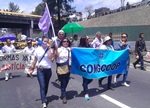Social Watch E-Newsletter - Issue 268 - August 5, 2016
Published on Fri, 2016-08-05 11:53
 |
| Issue 267 - July 29, 2016 |
|
|
Social Watch reports
Spotlight report on the 2030 Agenda
|
|
|
| |
|
| |
France: Implementing the 2030 Agenda at home and abroad presents new challenges
|
| |
|
| |
Can France be labeled as “developed” when 8 percent of the population lives in poverty and its mode of consumption and production are depleting the resources of the planet? Countries should not be rated only by GDP but also by their environmental sustainability and access to human rights for all of their citizens. Even though France is the world's sixth largest economy, poverty is widespread in the country and extreme poverty is persistent. Many people have to endure the violence of poverty and inequalities weaken social cohesion and democracy.
Regarding international responsibility, France's contribution to Official Development Assistance (ODA) is actually far from the 0.7% of the GNP which was pledged decades ago. In 2010 ODA was only 0.50 percent and dropped to 0.37 percent in 2015. Financial support from the richest countries to the poorest is indispensable to the achievement of SDGs. There is a gap between words and acts. Read more
|
| |
|
| |
|
| |
Guatemala: Faced with the 2030 Agenda
|
| |
|
| |

Photo: CONGCOOP
|
Guatemala reached the 2015 deadline for achieving the Millennium Development Goals (MDGs) without achieving a single one. To meet the 17 Sustainable Development Goals (SDGs) agreed in the 2030 Agenda for Sustainable Development, it is essential that social organizations play an important role. But this will only be possible if social action is matched by state and political will, which must be expressed in political and budgetary changes.
So far, the state has expressed only good wishes. A long list of shortcomings frames the barely positive scenario outlined to comply with the SDGs in Guatemala. If these great challenges are not faced by taking the necessary actions, the state will not meet the demands of the population and the SDGs will not be met by 2030 either.Read more
|
| |
|
| |
|
| |
Social Watch coalitions around the world are contributing their assessments and reports to the global Social Watch report 2016, under the overall theme Goals for 2030... and obstacles to getting there. The Social Watch network thus joins the current global discussions around a set of Sustainable Development Goals (SDGs) and on a new development framework and the need for civil society monitoring.
The Social Watch national platforms are independent coalitions of civil society organizations struggling for social and gender justice in their own countries. The Social Watch network has been publishing since 1996 yearly reports on how governments implement their international commitments to eradicate poverty and achieve equality between women and men.
|
| |
|
| |
|
| |
 |
From 11-20 July 2016, the 2016 meeting of the High-Level Political Forum on Sustainable Development (HLPF) took place at UN Headquarters in New York. Under the auspices of the UN Economic and Social Council (ECOSOC), the meeting focused on the theme of “Ensuring that no one is left behind.” It was attended by nearly 1500 Member States, Major Groups and other stakeholders (MGoS), and intergovernmental and UN organizations. In addition to the official program, 37 side events were organized.
According to the Rio+20 outcome document and G. A. Resolution 67/290, the HLPF has the mandate to follow-up and review the 2030 Agenda for Sustainable Development and the Sustainable Development Goals (SDGs). Since this was the first meeting after the adoption of the SDGs, 22 countries offered voluntary reviews to the implementation of the goals, focusing mostly on how countries are preparing for and managing their transition towards the implementation of the 2030 Agenda. Read more
|
|
| |
|
| |
|
| |
The ILO Social Protection Floors Recommendation No. 202, unanimously adopted by 184 members of the International Labour Conference in 2012, provided for the first time concrete content to the abstract right to social security.
Recommendation 202 was born out of a desire to protect the vulnerable from the consequences of the Global Financial Crisis (GFC). It was one of the nine UN crisis initiatives agreed upon between the heads of all UN agencies in April 2009, time by when it had become obvious that, barring decisive action, ultimately the poor, the sick and disabled, the old and the unemployed would have to bear the lion's share of the economic burden unleashed by the crisis. But, perhaps unintendedly, it helped define the right to social security, carrying important consequences for financial and fiscal policy . Read more
|
|
| |
|
|
|
| |
|
SOCIAL WATCH IS AN INTERNATIONAL NGO WATCHDOG NETWORK MONITORING POVERTY ERADICATION AND GENDER EQUALITY Social Watch >>
Social Watch E-Newsletter For comments, sugestions, collaborations contact us at: socwatch@socialwatch.orgTo stop receiving this newsletter send a message with the subject "unsubscribe" to: socwatch@socialwatch.org |
|
|
|
SUSCRIBE TO OUR NEWSLETTER
Submit
|
